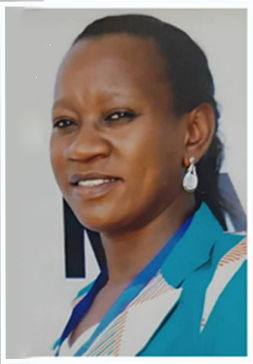 |
|
Title:
|
Dr.
|
|
Name:
|
Sarah Ezekiel Kisanga
|
|
College/School/Institute/ Directorate/Unit:
|
University of Dar es Salaam, Office of the Deputy Vice Chancellor Planning, Finance and Administration (DVC-PFA)
|
|
Department/Section:
|
University of Dar es Salaam Centre for Disability Services (CDS).
|
|
Position:
|
Manager, University of Dar es Salaam Centre for Disability Services
Senior Lecturer Department of Educational Psychology and Curriculum Studies
|
|
Current Summarised CV/Profile:
|
Dr. Sarah E. Kisanga is a full-time Senior Lecturer at the University of Dar es Salaam, Tanzania. She holds a PhD from Nottingham Trent University in the United Kingdom, specializing in special and inclusive education. She has a Master of Arts in Applied Social Psychology and Bachelor of Education in Educational Psychology from the University of Dar es Salaam. Her master’s thesis was on attitudinal factors affecting implementation of inclusive education in Tanzania. She teaches, supervises, mentors and conducts research in the area of special and inclusive education, educational psychology, and general psychology. She has been involved in developing and reviewing curriculum at undergraduate and postgraduate levels in special and inclusive education and participated in developing and validating policies on Disability and Special Educational Needs in Higher Learning Institutions. Dr. Kisanga has also been involved in various research activities, including teaching pedagogies in Tanzanian inclusive educational settings, accessibility of examinations and information for students with visual impairment, barriers to learning and participation in inclusive education settings, assistive technology for students with visual impairment, social barriers facing students with sensory impairment, coping with educational barriers in Tanzania inclusive education settings as well as challenges and coping strategies employed by student mothers in higher education institutions in Tanzania. Dr. Kisanga has published several research articles in local and international peer-reviewed journals and conducted peer reviews in local and international journals
|
|
Professional Details:
|
Level of Education and where attained:
2017 PhD, Nottingham Trent University, United Kingdom
2009 M.A (ASP), University of Dar Es Salaam, Tanzania
2007 B.Ed(PSY) 1st Class Honours, University of Dar Es Salaam, Tanzania.
2002 Diploma in Education (Distinction), Korogwe Teachers College, Tanzania.
|
|
Membership and Registration:
|
ORCID Membership: https://orcid.org/0000-0003-1004-4886
Google scholar: https://scholar.google.com/citations?user=vsvwdyUAAAAJ&hl=en
Professional Membership Boards:
- Editorial Board Member: Papers in Education and Development Journal
- Associate Editor: Mkwawa Journal of Education and Learning (MJEL)
- Member: University of Dar es Salaam, Academic Staff Assembly (UDASA)
|
|
Important Contribution:
|
Participated in developing and validating policies in special needs and inclusion in higher learning institutions.
- Dr. Kisanga has been facilitating capacity building on inclusive education to university management, academic and administrative staff as well as students in different higher learning institutions.
- Dr. Kisanga has been participating in the evaluation/and review of degree programmes on special and inclusive education.
- Participated in the development of various guidelines: Identification, assessment and provisional of support services to staff and students with Special needs, provisional of guidance and counselling to students with special needs, and Engagement of Assistants to Students with Disabilities
|
|
Publications:
|
- Wakuru, M., Kisanga, S.E., Vuzo, M. (2022). Primary School Teachers’ Pedagogical Practices and Inclusive Education: A Case of Pupils with Moderate Deaf-blindness in Tanzania, Journal of Adult Education, 24, 183-207
- Kisanga, S.E & Matiba, F.M. (2021). Coping strategies student-mothers employ in pursuing higher education studies in Tanzania: A qualitative study, Current psychology, DOI: https://doi.org/10.1007/s12144-021-01770-z
- Matiba, F.M, & Kisanga, S.E, (2021). Student-Mothers’ experience in Tanzania Higher Education Institutions: Motivational Factors and Challenges, Journal of Education Humanities and Sciences, 10(2),80-97https://jehs.duce.ac.tz/index.php/jehs
- Kisanga, D. H & Kisanga, S. E. (2020). Access of assistive technology among students with visual impairment in higher education institutions in Tanzania: Challenges and coping mechanisms. University of Dar es Salaam Library Journal, 15 (2), 137-151.
- Kisanga, S.E & Kisanga D. H. (2020). The role of assistive technology devices in assisting the learning and participation of students with visual impairment in higher education institutions in Tanzania. Disability and Rehabilitation: Assistive Technology, DOI: 10.1080/17483107.2020.1817989
- Kisanga, S.E. (2020). Coping with educational barriers in Tanzanian inclusive education settings: evidence from students with sensory impairment. Current Psychology. DOI 10.1007/s12144-020-00977-w
- Kisanga, S. E. (2019) ‘‘It is not our Fault. We are the Victims of the Education System’’: Assessment of the Accessibility of Examinations and Information for Students with Visual Impairment in Tanzania. The Journal of the International Association of Special Education, 19(01), 15-26
- Kisanga, S. E. (2019). Barriers to Learning faced by students who are Deaf and Hard of Hearing in higher education institutions in Tanzania. Paper in Education and development 37(2), 201 – 218
- Kisanga, S. E., & Richards, G. (2018). Teaching pedagogies in Tanzanian inclusive educational settings: Do they respond to diverse needs? Voices from students with visual impairment. British Journal of Visual Impairment, 36(3), 216–226. DOI: 10.1177/0264619618780914.
- Wakuru, M., Kisanga, S. E & Vuzo, M. (2020). Teachers’ knowledge and perception on the inclusion of pupils with moderate deaf-blindness in primary school classrooms: Implications for instructional practices. Mkwawa Journal of Education and Development, 4(1); 21-25 DOI: https://doi.org/10.37759/mjed.2020.4.1.2
|


